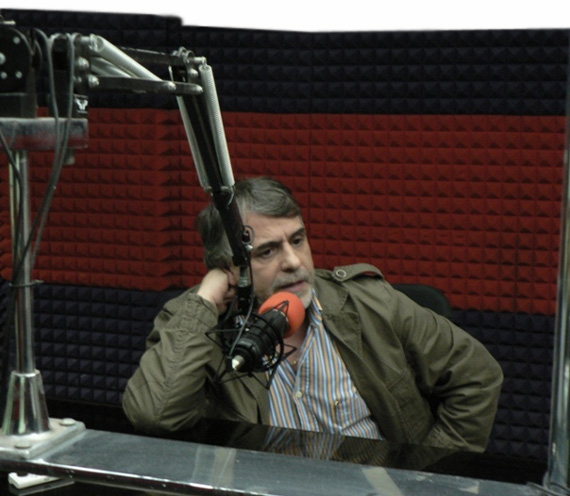|
On the first
day of his mission to Honduras, the Secretary of the Latin American Regional
Office of the IUF, Gerardo Iglesias, visited the installations of Radio Globo in
Tegucigalpa to participate in the program of radio journalist Félix Centeno, who
has committed all his efforts to popular resistance against the June 28 coup.
“It’s a
pleasure to be here, with our brothers and sisters, representing the
International Union of Food, Agricultural, Hotel, Restaurant, Catering, Tobacco
and Allied Workers’ Associations (IUF), a global organization with 350
affiliates from 120 countries in the world, including, of course, Honduras,
where we have the Union of Beverage and Related Industry Workers (STIBYS)
and National Agricultural Institute Workers’ Union (SITRAINA), and
Carlos H. Reyes, a member of the IUF’s International Executive
Committee,” Iglesias started out saying.
The show’s host
informed that Carlos H. Reyes had been discharged from Honduras’ social
security health facility (ISSH), where he had been recovering from “a
brutal and savage beating by the country’s antiriot police”.
“I’ve known
Carlos for 20 years, and when we found out what had happened, Rel-UITA
(IUF Latin American office) immediately launched a solidarity and
denunciation campaign,” the IUF’s Latin American regional secretary
continued.
Iglesias also
informed that Rel-UITA was conducting a multi-language news campaign to cover
the situation. “Our website is publishing, in three language, all the material
sent by our correspondent, who’s been here for over 30 days.”
“It’s a way of
contributing to Honduras’ movement of struggle and resistance, which is why we
didn’t think twice about sending a correspondent to cover the events.”
“Democracy is
crucial to the workers’ and peasants’ movements,” Iglesias explained,
“because only in democracy can they fight to achieve their demands. Today, the
coup makes it very hard to move forward with these demands.”
“I come from a
country that suffered a coup in 1973, which forced us to live under a military
dictatorship for 11 years. We know very well what that means. This was also a
period in which there were dictatorships in Brazil, Paraguay,
Argentina and Chile.”
“The labor
movement was the sector most brutally persecuted and repressed, and that was how
neoliberalism was consolidated, by attacking the popular and trade union
movements.”
“We’re here
because in those dark years we received enormous international solidarity, and
we say that solidarity is not something that is answered merely with gratitude.
Solidarity is returned with other acts of solidarity.”
“Which is why
the IUF began informing on the situation to our affiliates even before
the coup, and why our correspondent is here, reporting daily on what is
happening to Hondurans, who do not want to live under a military dictatorship
that excludes the people,” he concluded.
 |